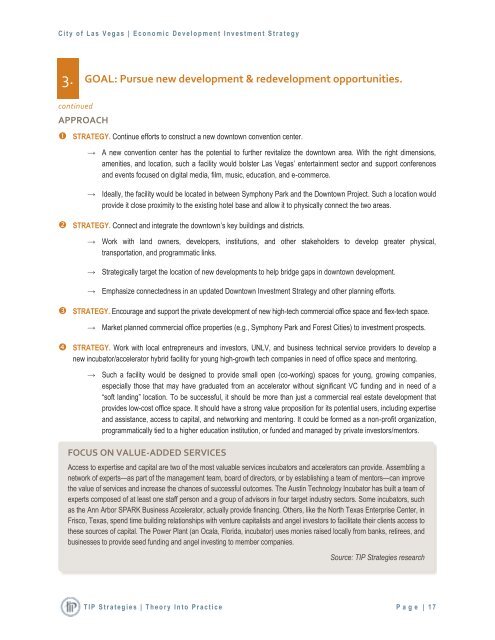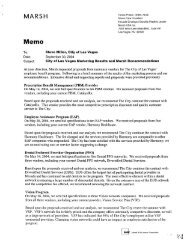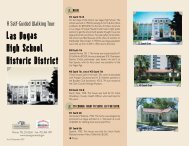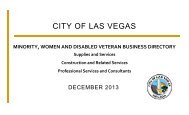Economic Development Investment Strategy - City of Las Vegas
Economic Development Investment Strategy - City of Las Vegas
Economic Development Investment Strategy - City of Las Vegas
Create successful ePaper yourself
Turn your PDF publications into a flip-book with our unique Google optimized e-Paper software.
C i t y o f L a s V e g a s | E c o n o m i c D e v e l o p m e n t I n v e s t m e n t S t r a t e g y<br />
3. GOAL: Pursue new development & redevelopment opportunities.<br />
continued<br />
APPROACH<br />
STRATEGY. Continue efforts to construct a new downtown convention center.<br />
→ A new convention center has the potential to further revitalize the downtown area. With the right dimensions,<br />
amenities, and location, such a facility would bolster <strong>Las</strong> <strong>Vegas</strong>’ entertainment sector and support conferences<br />
and events focused on digital media, film, music, education, and e-commerce.<br />
→ Ideally, the facility would be located in between Symphony Park and the Downtown Project. Such a location would<br />
provide it close proximity to the existing hotel base and allow it to physically connect the two areas.<br />
STRATEGY. Connect and integrate the downtown’s key buildings and districts.<br />
→ Work with land owners, developers, institutions, and other stakeholders to develop greater physical,<br />
transportation, and programmatic links.<br />
→ Strategically target the location <strong>of</strong> new developments to help bridge gaps in downtown development.<br />
→ Emphasize connectedness in an updated Downtown <strong>Investment</strong> <strong>Strategy</strong> and other planning efforts.<br />
STRATEGY. Encourage and support the private development <strong>of</strong> new high-tech commercial <strong>of</strong>fice space and flex-tech space.<br />
→ Market planned commercial <strong>of</strong>fice properties (e.g., Symphony Park and Forest Cities) to investment prospects.<br />
STRATEGY. Work with local entrepreneurs and investors, UNLV, and business technical service providers to develop a<br />
new incubator/accelerator hybrid facility for young high-growth tech companies in need <strong>of</strong> <strong>of</strong>fice space and mentoring.<br />
→ Such a facility would be designed to provide small open (co-working) spaces for young, growing companies,<br />
especially those that may have graduated from an accelerator without significant VC funding and in need <strong>of</strong> a<br />
“s<strong>of</strong>t landing” location. To be successful, it should be more than just a commercial real estate development that<br />
provides low-cost <strong>of</strong>fice space. It should have a strong value proposition for its potential users, including expertise<br />
and assistance, access to capital, and networking and mentoring. It could be formed as a non-pr<strong>of</strong>it organization,<br />
programmatically tied to a higher education institution, or funded and managed by private investors/mentors.<br />
FOCUS ON VALUE-ADDED SERVICES<br />
Access to expertise and capital are two <strong>of</strong> the most valuable services incubators and accelerators can provide. Assembling a<br />
network <strong>of</strong> experts—as part <strong>of</strong> the management team, board <strong>of</strong> directors, or by establishing a team <strong>of</strong> mentors—can improve<br />
the value <strong>of</strong> services and increase the chances <strong>of</strong> successful outcomes. The Austin Technology Incubator has built a team <strong>of</strong><br />
experts composed <strong>of</strong> at least one staff person and a group <strong>of</strong> advisors in four target industry sectors. Some incubators, such<br />
as the Ann Arbor SPARK Business Accelerator, actually provide financing. Others, like the North Texas Enterprise Center, in<br />
Frisco, Texas, spend time building relationships with venture capitalists and angel investors to facilitate their clients access to<br />
these sources <strong>of</strong> capital. The Power Plant (an Ocala, Florida, incubator) uses monies raised locally from banks, retirees, and<br />
businesses to provide seed funding and angel investing to member companies.<br />
Source: TIP Strategies research<br />
T I P S t r a t e g i e s | T h e o r y I n t o P r a c t i c e P a g e | 17

















